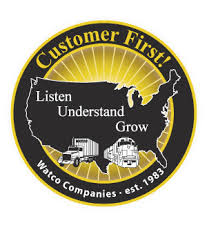
Watco Companies LLC
Watco Companies, LLC. is a Pittsburg, KS., based transportation company serving transportation, mechanical, and terminal & port services needs of Customers throughout the nation. Watco is the owner of Watco Transportation Services, Inc. (WTS), the largest privately-held short line railroad company in the U.S. operating 32 short line railroads on more than 3,500 miles of track as well as 28 industrial contract switching locations. Watco’s Mechanical Services division operates 15 railcar repair shops, 4 locomotive shops and 19 mobile mechanical shops. The Terminal & Port Services division currently manages 20 transload facilities, 7 warehouses and 2 ports. Watco also owns Greens Port Industrial Park located in the Houston, Texas, ship channel offering services such as warehousing, lay down storage, leasing of industrial property, access to deep water dock and barge, contract stevedoring, rail and truck transportation.